You can now add Healthify as a preferred source on Google. Click here to see us when you search Google.
Vegan and vegetarian diets
Key points about vegan and vegetarian diets
- There are many benefits to eating a plant-rich diet.
- A well-planned vegan or vegetarian diet can supply all the nutrients needed for good health.
- Certain nutrients may be more difficult to obtain, eg, iron, vitamin B12, calcium, zinc, vitamin D and omega 3 fats. Food sources for these are covered below.
- Talk to your healthcare provider if you're concerned about meeting your nutrition requirements when eating a vegan or vegetarian diet.
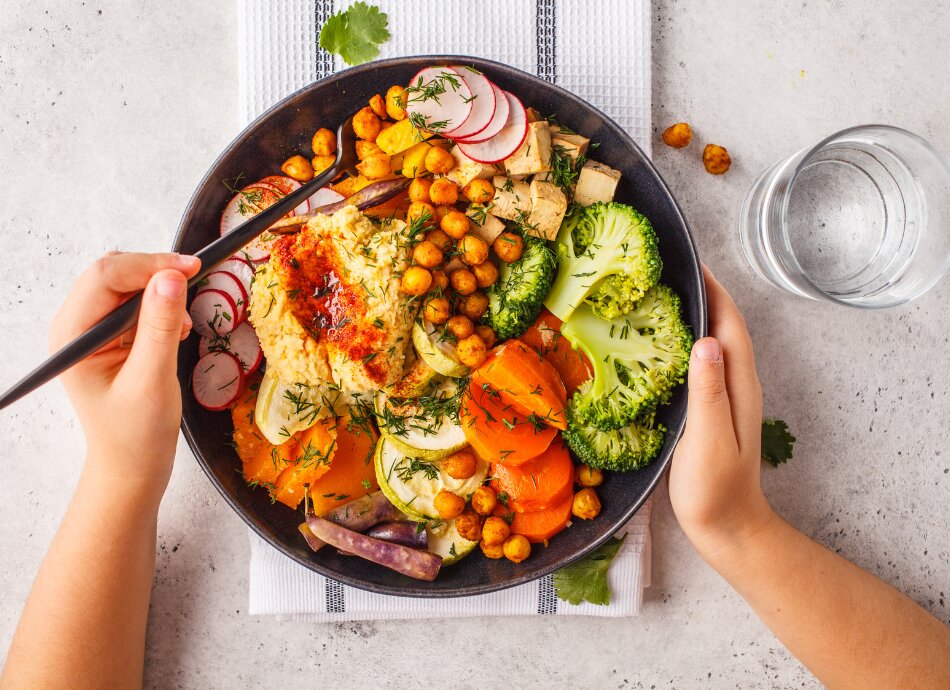
A vegetarian diet excludes meat, chicken, fish and seafood. There are a few variations of a vegetarian diet that depend on whether you eat or exclude eggs, dairy and fish.
A vegan diet excludes all meat and animal products (meat, chicken, fish, seafood, dairy and eggs).
A plant-based diet is a way of eating where the focus is on filling up your plate with plant foods. People who eat a plant-based diet may still include small amounts of meat and other animal products too.
We don’t have accurate or up-to-date data on the number of people living in Aotearoa New Zealand following a vegan or vegetarian diet. The popularity of plant-based diets seems to be growing and many New Zealanders are choosing to eat less meat.
Some recent data from the New Zealand population suggests that:
- 3% don’t eat red meat, but do eat chicken, fish and seafood
- 2% are vegetarian
- 1.5% are pescetarian (avoid meat, but eat fish)
- Less than 1% are vegan.
Women (especially those between 15 and 24 years of age), Asian people, active people and people with a university qualification are more likely to be vegetarian or vegan. Current smokers and people over 75 years are less likely to be vegetarian or vegan.
There are many reasons a person may choose to exclude animal foods from their diet.
These include:
- animal welfare
- environmental reasons (a vegan diet uses less land, water and energy than one that contains meat and dairy)
- religion
- health
- personal preferences (taste and texture of meat)
- allergies (milk, fish or seafood)
- financial reasons
- to reduce calories or food intake (which may contribute to disordered eating).
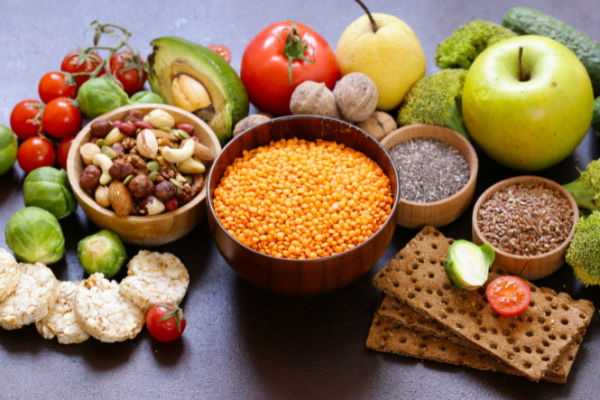
Image credit: Canva
There's good research showing that people following a vegan or vegetarian diet have lower blood pressure, lower low density lipoprotein (LDL) cholesterol, improved weight and better blood glucose control than non-vegetarian people.
Some research has shown that vegan and vegetarian diets are linked to a reduced risk of diseases such as heart disease, diabetes and cancer.
The key thing to note when looking at the research, is that vegans and vegetarians tend to lead a healthier life overall. This explains some, but not all, of the lower risk seen in these groups. For example, people who follow a vegetarian diet may do more exercise or drink less alcohol.
A well-planned vegan or vegetarian diet can supply all the nutrients needed for good health. However, some nutrients such as iron, zinc and vitamin B12 are harder to get when you exclude animal products. If you're pregnant, planning a pregnancy, breastfeeding or have young children, it's best to seek advice from your healthcare provider to ensure your nutrition needs are met.
Iron
Iron is important for producing blood and moving oxygen around the body. Plant sources include legumes, tofu, nuts and seeds, whole grains, green leafy vegetables, and breakfast cereals with iron added. The type of iron found in plant foods isn't absorbed as well as the iron from animal foods.
Eating foods containing vitamin C with plant-based foods can help to boost the absorption of iron.
Vitamin C-rich foods include citrus fruits, strawberries tomato, capsicum, silverbeet, cabbage and broccoli.
Avoid tea and coffee within 1 hour of meals for better absorption of iron. Read more about iron deficiency .
Vitamin B12
Vitamin B12 helps to form red blood cells and maintain healthy nerves. People following a vegan diet are at risk of developing vitamin B12 deficiency because it’s only found in animal products such as meat, dairy and eggs. Some plant foods such as soy milk, yeast extract (eg, Marmite), nutritional yeast and cereals have B12 added.
If you can't get enough vitamin B12 from your diet, your doctor, pharmacist or dietitian will recommend a vitamin B12 supplement.
Note that some foods, such as kimchi, miso, seaweed or spirulina, may contain vitamin B12 but in very small amounts or in a form that can’t be used by your body. Read more about vitamin B12.
Protein
Most people eating a vegetarian or vegan diet can easily get enough protein by eating a wide variety of protein-rich foods.
These include:
- legumes (eg, beans, peas and lentils)
- nuts and seeds (includes peanut butter)
- soy products (soy milk, tempeh, tofu, edamame beans)
- whole grains (oats, barley, quinoa, brown rice)
- eggs and dairy (vegetarians only).
Note: Some meat-free products made from soy or legumes can be a good source of protein, but it's important to choose the least processed options as they can contain a lot of sodium (salt) too.
Read more about protein foods..
Omega 3 fats
Omega 3 fats are a type of polyunsaturated fat and protect your health. Fish, seafood and seaweed are a good source of omega-3 fats. Plant foods like flaxseeds (linseed), chia seeds and hemp seeds and their oils are also a source of omega-3 fats. Read more about fats and oils.
Zinc
Zinc is important for skin health, wound healing and immunity.
Sources of zinc for vegans include legumes, nuts and seeds, and whole grains. In addition, vegetarians can get zinc from dairy and eggs. Read more about zinc.
Calcium
Calcium is important for strong bones and teeth, nerve and muscle function. When dairy foods are not included in vegan diet, it’s important to get calcium from plant-based milks (with calcium added), leafy green vegetables, almonds, sesame seeds, tofu, tempeh. Read more about calcium.
Vitamin D
Calcium and vitamin D (which we get from the sun) work together to support bone health. People with very little sun exposure, such as older people, need to be eating foods rich in Vitamin D. Vegetarian sources include eggs and dairy products, however, if you avoid or limit these foods you might want to talk to your healthcare provider about taking a supplement. Read more about vitamin D.
Veganism and eating disorders(external link) Eating Disorders Victoria, Australia
Vegan pregnancy and raising vegan kids(external link) Vegan Society of Aotearoa New Zealand
Plant-based diets – are they healthy for a child?(external link) BPAC, NZ
Resources
Easy ways to eat more veges & tasty snacks(external link) Health Promotion Agency, NZ
Eating for healthy vegetarians(external link) HealthEd, NZ
Behind the hype – plant-based milk alternatives(external link) HealthEd, NZ
References
- Plant-based vegetarian and vegan diets(external link) Heart Foundation, NZ
- Oussalah A, Levy J, Berthezène C, et al. lpers DH, Guéant JL. Health outcomes associated with vegetarian diets – an umbrella review of systematic reviews and meta-analyses(external link) Clin Nutr. 2020 Nov;39(11):3283-3307
- Dinu M, Abbate R, Gensini GF, et al. Vegetarian, vegan diets and multiple health outcomes – a systematic review with meta-analysis of observational studies(external link) Crit Rev Food Sci Nutr. 2017 Nov 22;57(17):3640-3649
- Wang TKroeger CMCassidy S, et al. Vegetarian dietary patterns and cardiometabolic (external link)risk in people with or at high risk of cardiovascular disease – a systematic review and meta-analysis(external link) JAMA Netw Open 2023;6(7):e2325658
- Greenwell J, Grant M, Young L, et al. The prevalence of vegetarians, vegans and other dietary patterns that exclude some animal-source foods in a representative sample of New Zealand adults(external link) Public Health Nutr. 2024;27(1):e5
- Milfont TL, Satherley N, Osborne D, et al. To meat, or not to meat – a longitudinal investigation of transitioning to and from plant-based diets (external link) Appetite 2021 Nov 1;166:105584.
- Eating and activity guidelines for New Zealand adults(external link) Health New Zealand | Te Whatu Ora, NZ, 2020
- What is a vegetarian diet?(external link) Dietitians Australia, Australia, 2023
- Vegetarian, vegan and plant-based diet(external link) British Dietetic Association (BDA), UK, 2024
- Vesanto M, Craig W, Levin S. Position of the Academy of Nutrition and Dietetics – vegetarian diets(external link) J Acad Nutr and Diet. 2016;116(12):1970–1980
- Are meat-free products better for you?(external link) Heart Foundation, NZ, 2019
Brochures
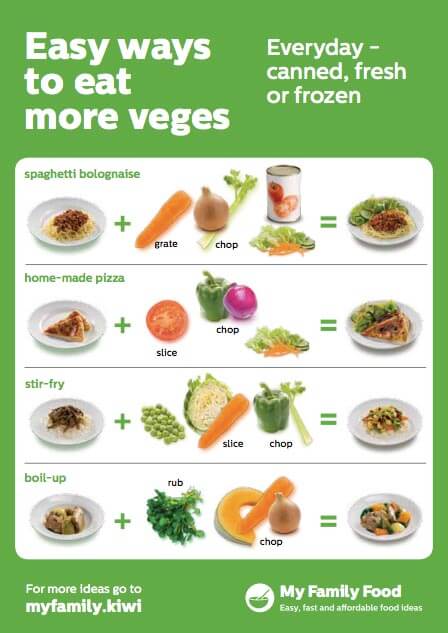
Health Promotion Agency, NZ, 2021
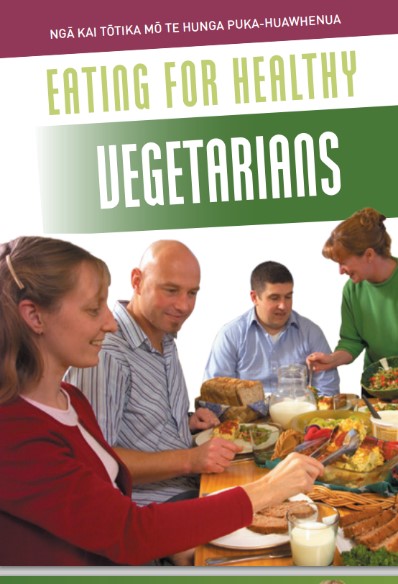
HealthEd, NZ, 2019
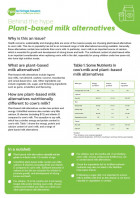
Behind the hype – plant-based milk alternatives
HealthEd, NZ, 2022
Credits: Healthify editorial team. Healthify is brought to you by Health Navigator Charitable Trust.
Reviewed by: Lily Henderson, Registered Dietitian.
Last reviewed:





